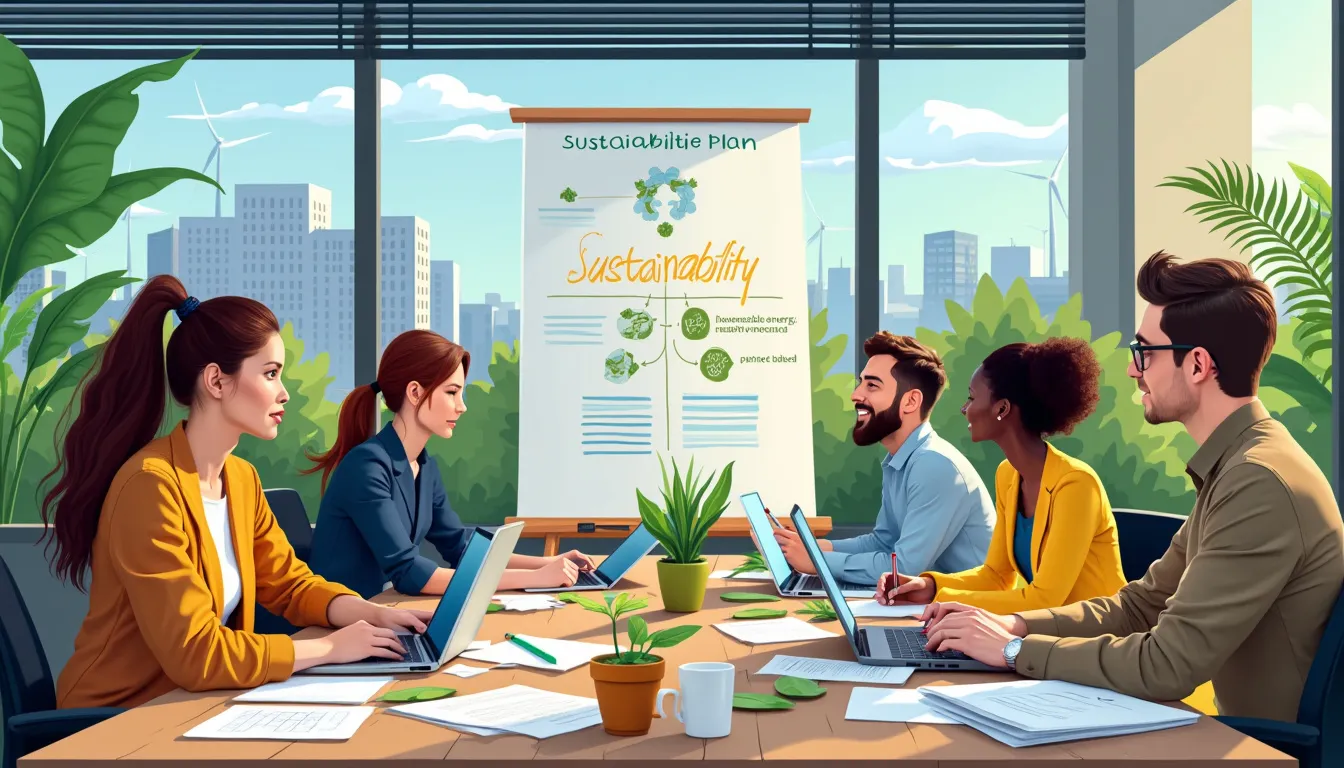In today’s rapidly evolving business landscape, the concept of corporate sustainability has shifted from being a niche concern to a pivotal strategy for forward-thinking companies. Corporate sustainability involves adopting practices that not only enhance profitability but also ensure the well-being of the environment and society. This approach is gaining traction as businesses recognize the critical importance of sustainable development in securing their long-term success, competitive edge, and the trust of increasingly conscious consumers.
Now more than ever, embracing corporate sustainability is not just a moral imperative but a strategic necessity. Companies around the world are beginning to understand that sustainable practices are key to mitigating the risks posed by climate change, resource depletion, and social inequities. This awakening is driving a new era of business—a future where the principles of sustainability are interwoven into the fabric of corporate operations and decision-making.
This comprehensive guide will delve into the multi-faceted world of corporate sustainability, exploring its immense potential to reshape the future of business. We’ll unpack the economic advantages of sustainable practices, from cost savings to enhanced brand reputation, backed by compelling examples of companies that have thrived through their commitment to sustainability. We will also offer practical advice on developing and implementing effective sustainability strategies, focusing on critical areas like energy efficiency, waste reduction, ethical sourcing, and community engagement. Additionally, we’ll examine the transformative role of technology and innovation in advancing these initiatives.
As we look toward the future, this article will highlight emerging trends and predict how global regulations and policies will further influence corporate sustainability. We’ll discuss the evolving role of corporate social responsibility (CSR) and provide actionable insights to help businesses stay ahead of the curve by fully integrating sustainability into their core operations. By embracing sustainable practices today, companies can not only contribute to a healthier planet but also ensure their own enduring success in the years to come.
Introduction to Corporate Sustainability
Corporate sustainability is more than just a buzzword; it’s a fundamental shift in how businesses operate. In essence, corporate sustainability refers to practices and strategies that companies implement to manage their environmental, social, and economic impacts. The goal is to ensure long-term business success while contributing positively to society and the planet. This approach is not only ethically important but also increasingly essential for a company’s survival and growth.
Importance of Sustainability in Modern Business
The importance of sustainability in modern business cannot be understated. In today’s globalized and highly connected world, consumers, investors, and employees are more informed and conscientious about environmental and social issues. Companies are under greater scrutiny and face increasing pressure to act responsibly.
According to a Nielsen report, 73% of global consumers indicate a preference for brands that are deemed sustainable. Additionally, the Harvard Business Review has noted that companies with strong sustainability practices are more resilient and lead to better financial performance. This shift towards responsible business conduct is not just a trend—it’s a necessity.
Overview of the Article’s Focus on the Future of Business via Corporate Sustainability
This article delves into how businesses can adapt and thrive in this new era by embracing corporate sustainability. We will explore the benefits of sustainable practices, practical strategies for implementation, and what the future holds for companies that prioritize sustainability. By understanding the importance and advantages of sustainability, both individuals and business owners can take meaningful steps toward a more sustainable future.

Benefits of Corporate Sustainability for Businesses
Economic Advantages of Sustainable Practices
Embracing corporate sustainability is not just a moral decision; it’s a financially savvy one. Businesses that incorporate sustainable practices often see considerable economic benefits. One clear advantage is cost savings. By optimizing energy use and reducing waste, companies can significantly lower their utility bills and associated operational costs. For example, IKEA has invested heavily in renewable energy sources such as solar and wind, aiming to produce as much renewable energy as the total energy it consumes by 2020. This investment has not only reduced their carbon footprint but also translated into substantial cost savings.
Moreover, sustainable practices can lead to increased market opportunities. A 2017 study by Nielsen found that consumers are increasingly willing to pay more for products and services provided by companies committed to positive social and environmental impact. As demand for eco-friendly products grows, businesses that prioritize sustainability are well-positioned to capture new market segments and gain a competitive edge.
Enhanced Brand Reputation and Customer Loyalty
Today’s consumers are more informed and conscious about their purchases than ever before. They prefer to support businesses that align with their values, particularly those focused on sustainability. A strong commitment to sustainable practices can enhance a company’s brand reputation and foster customer loyalty.
Take Patagonia, for example. This outdoor clothing brand has built a loyal customer base by maintaining a robust commitment to environmental sustainability. Through campaigns like Worn Wear, which encourages customers to repair and reuse their gear, Patagonia not only reduces waste but also strengthens its brand message. This approach has solidified their reputation as a leader in corporate sustainability, resulting in a devoted customer following.
Research supports this trend: according to a 2019 survey by Cone Communications, 76% of consumers would refuse to buy a company’s products or services upon learning it supported an issue contrary to their beliefs. This statistic underscores the risk businesses face if they ignore the importance of sustainability in their branding.
Operational Efficiency and Cost Savings
Beyond bolstering a company’s public image, corporate sustainability directly contributes to improved operational efficiency. By evaluating and optimizing supply chains, businesses can reduce waste and maximize resource use, resulting in notable cost savings. A striking example is Unilever’s Sustainable Living Plan. This comprehensive strategy aims to decouple the company’s growth from its environmental impact. By focusing on sustainable sourcing and reducing emissions, Unilever has saved €700 million in costs since 2008 while simultaneously achieving 75% of its raw materials from sustainable sources by 2019.
Incorporating sustainability into operations often promotes innovation, leading to better products and more efficient processes. Companies find creative solutions to challenges, driving improvements across the board. General Electric’s (GE) Ecomagination initiative exemplifies this. By investing in eco-friendly technologies, GE has not only reduced its environmental impact but also turned sustainability into a profit center, generating over $232 billion in revenue from Ecomagination products since its inception in 2005.
Examples of Companies Succeeding Through Corporate Sustainability
Numerous companies have set benchmarks in corporate sustainability, demonstrating its tangible benefits. Let’s look at a few exemplary cases:
1. **Tesla**
Tesla has revolutionized the automotive industry with its electric vehicles (EVs). By promoting sustainable transportation, Tesla reduces greenhouse gas emissions while achieving significant business success. The company’s focus on sustainability has helped it capture a significant share of the EV market and build a powerful brand.
2. **Apple**
Apple has made commendable strides in sustainability, pledging to make all its products from recycled or renewable materials. By 2020, the company achieved a neutral carbon footprint for its worldwide corporate operations. Apple’s efforts have not only garnered positive press but also attracted environmentally conscious consumers.
3. **Danone**
This multinational food-products corporation places a strong emphasis on sustainability, committing to becoming carbon neutral by 2050. Danone’s One Planet. One Health initiative focuses on sustainable agriculture, renewable energy, and circular economies. By integrating these practices, Danone has solidified its reputation as a responsible and forward-thinking company.
4. **Google**
Google is another sustainability trailblazer. The tech giant has been carbon neutral since 2007, and in 2017, it became the largest corporate purchaser of renewable energy. Google’s continuous investment in renewable energy sources and innovative data center designs have significantly reduced its environmental impact and operational costs.
These examples illustrate that corporate sustainability is not a mere trend but a robust strategy for long-term success. Businesses that prioritize sustainability can enjoy economic advantages, enhanced brand loyalty, and operational efficiencies. By following these examples, companies of all sizes can harness the power of sustainability to drive growth and resilience.

Implementing Corporate Sustainability Strategies
Steps to Develop a Sustainability Plan
Creating a robust sustainability plan is your roadmap to integrating corporate sustainability into your business model. Start by conducting a materiality assessment to determine the environmental, social, and economic issues most pertinent to your stakeholders. This should involve engaging with employees, customers, suppliers, and investors to gain a comprehensive view of their sustainability priorities.
After identifying your key areas of focus, set clear, measurable goals. Employ the SMART criteria—specific, measurable, achievable, relevant, and time-bound—to ensure your targets are realistic and trackable. For instance, you might commit to reducing carbon emissions by 20% over the next five years or achieving zero waste in your manufacturing operations.
Next, develop a detailed action plan outlining steps to achieve these goals. Include timelines, responsible parties, and necessary resources. Regular monitoring and reporting are essential; thus, establish a robust system for collecting data and analyzing progress. Transparency fosters accountability and builds trust with stakeholders, so consider publishing annual sustainability reports.
Key Areas: Energy Efficiency, Waste Reduction, Ethical Sourcing, and Community Engagement
Breaking down corporate sustainability into key actionable areas makes implementation more manageable.
Energy Efficiency
Energy efficiency is a cornerstone of corporate sustainability. Begin by conducting an energy audit to understand your current consumption patterns and identify opportunities for improvement. Simple measures like upgrading to LED lighting, optimizing HVAC systems, or installing energy-efficient equipment can lead to significant savings. For a more substantial impact, consider investing in renewable energy sources such as solar or wind power. Companies like Google have committed to running entirely on renewable energy, showcasing both feasibility and long-term benefits.
Waste Reduction
Reducing waste not only minimizes your environmental footprint but also leads to significant cost savings. Implement a robust recycling program, and encourage employees to participate actively. Look into ways to reduce waste at the source, such as switching to digital solutions to cut down on paper use or redesigning products to use fewer materials. Dive into circular economy principles where products are designed for a longer lifecycle, and materials are continuously reused. Businesses like IKEA are leading by example, aiming to become a circular business by 2030.
Ethical Sourcing
Your supply chain plays a crucial role in your sustainability journey. Ethical sourcing involves ensuring that your suppliers adhere to fair labor practices, environmental standards, and ethical business operations. This not only mitigates risks but also enhances your brand’s credibility. Establish partnerships with suppliers who share your values, and regularly audit their practices. Big brands like Patagonia have made headlines with their commitment to ethical sourcing, proving that conscientious practices resonate with consumers.
Community Engagement
Engaging with local communities strengthens your social license to operate and fosters goodwill. Develop programs that address local needs, such as educational initiatives, health and wellness programs, or economic development projects. Encourage employee volunteerism and consider matching their contributions. Starbucks’ community store model is a fantastic example, where a portion of the profits is reinvested into community projects.
Role of Technology and Innovation in Sustainability Efforts
Technology is a powerful enabler of corporate sustainability. Innovations in IoT, AI, and blockchain have transformed how businesses address sustainability challenges.
The Internet of Things (IoT)
IoT devices can optimize energy consumption, reduce waste, and enhance overall efficiency. Smart sensors in buildings can adjust lighting and temperature based on occupancy, saving both energy and money. For instance, Schneider Electric has developed smart building solutions that have significantly cut energy costs and emissions for their clients.
Artificial Intelligence (AI)
AI algorithms can analyze vast amounts of data to predict maintenance needs, optimize logistics, and enhance resource management. In agriculture, precision farming uses AI to maximize crop yields while minimizing water and fertilizer use, thereby reducing environmental impact.
Blockchain Technology
Blockchain ensures transparency and traceability in supply chains, instilling trust and reducing the risk of unethical practices. Companies like IBM are pioneering blockchain solutions that allow consumers to trace the journey of their products from farm to table, ensuring ethical sourcing.
Overcoming Common Challenges in Adopting Sustainable Practices
Transitioning to sustainable practices is not without hurdles. However, with strategic planning and perseverance, these can be navigated.
Initial Costs
Sustainable initiatives often require upfront investment, which can be daunting. Conduct a cost-benefit analysis to understand the long-term savings and benefits. Financing options like green bonds, government grants, or partnering with investors focused on sustainability can alleviate initial financial burdens.
Resistance to Change
Change can meet resistance from employees accustomed to traditional practices. Foster a culture of sustainability by embedding these values into your corporate DNA. Provide training, engage staff through innovative programs, and celebrate sustainability achievements to build a supportive internal culture.
Keeping Pace with Evolving Regulations
Sustainability regulations are continually evolving, which can be challenging to navigate. Stay informed by subscribing to industry newsletters, participating in webinars, and joining professional sustainability networks. Engaging with consultants or hiring a sustainability officer can also provide crucial expertise and guidance.
Implementing corporate sustainability strategies is an ongoing process, requiring commitment and adaptive management. By setting clear goals, focusing on key areas, leveraging technology, and overcoming common challenges, businesses can not only meet their sustainability targets but also unlock substantial economic and reputational benefits. Embrace the transformative journey towards a sustainable future—your company, your stakeholders, and the planet will thank you.

The Future Landscape of Corporate Sustainability
As we advance into the future, the landscape of corporate sustainability is set to evolve remarkably. The coming decade will bring profound changes driven by innovative trends, stringent global regulations, and a heightened emphasis on corporate social responsibility (CSR). Companies that proactively adapt to these shifts will not only survive but thrive in a marketplace that increasingly values sustainable practices. Let’s dive into the predictions for sustainability trends, the impact of global policies, the evolving role of CSR, and strategic ways businesses can stay ahead.
Predictions for Sustainability Trends in the Next Decade
The future of corporate sustainability will be marked by several key trends that promise to reshape how businesses operate. One significant trend is the increased integration of circular economy principles. Companies will shift from a linear ‘take, make, dispose’ model to one that emphasizes resource efficiency, recycling, and reusability. This transition not only conserves resources but also opens up new business opportunities in sustainable product and service innovations.
Another anticipated trend is the rise of green finance. Investors and financial institutions increasingly recognize the long-term value of sustainable businesses. Access to capital for companies demonstrating robust environmental, social, and governance (ESG) criteria compliance will expand. Green bonds, sustainability-linked loans, and other financial instruments dedicated to funding eco-friendly projects will become more prevalent, facilitating the transition to sustainable business models.
The Impact of Global Regulations and Policies on Corporate Sustainability
Regulations and policies worldwide are evolving to enforce stricter environmental protection and social governance standards. For instance, the European Union’s Sustainable Corporate Governance Initiative aims to embed sustainability into corporate decision-making. This policy shift will compel companies to prioritize long-term sustainability over short-term financial gains.
Similarly, climate action policies such as the Paris Agreement and the increasing number of countries pledging to achieve net-zero carbon emissions are putting pressure on businesses to decarbonize their operations. In the United States, the Securities and Exchange Commission (SEC) is enhancing disclosure requirements related to climate risks, pushing companies to be more transparent about their environmental impact.
The Evolving Role of Corporate Social Responsibility (CSR) in Business
Corporate Social Responsibility (CSR) is no longer a peripheral aspect of business strategy—it is central to it. Consumers, employees, and other stakeholders are holding companies accountable for their social and environmental footprints. Businesses are increasingly embracing a holistic approach to CSR, integrating it with core operations to drive sustainable growth.
Take for example Unilever, which has committed to ensuring that all its plastic packaging is reusable, recyclable, or compostable by 2025. This commitment not only addresses environmental concerns but has also driven brand loyalty and consumer trust. Similarly, Patagonia leads the way in environmental activism, not just by adopting sustainable practices but by advocating for broader systemic changes.
How Businesses Can Stay Ahead by Embracing Sustainability
To stay ahead in the evolving landscape of corporate sustainability, businesses must adopt a proactive rather than reactive approach. Here are some strategies to consider:
- Embrace Innovation: Companies need to invest in R&D to develop new materials, products, and processes that reduce environmental impact. For example, Adidas’ Futurecraft Loop initiative aims to create fully recyclable shoes, transforming product lifecycles.
- Educate and Engage Stakeholders: Successful sustainability efforts are built on a foundation of education and engagement. Train employees on sustainability practices, inspire them to contribute ideas, and communicate progress transparently to customers and investors.
- Leverage Technology: Digital transformation can significantly enhance sustainability efforts. Technologies like AI, IoT, and blockchain offer new ways to optimize resource use, track supply chains, and ensure compliance with sustainability standards.
- Collaborate Across Industries: Building partnerships across industries can accelerate sustainable innovations. Collaborative efforts like the Sustainable Apparel Coalition exemplify how pooling resources and expertise can drive significant eco-friendly advancements.
- Adopt Comprehensive Measurement Tools: Implementing robust ESG metrics and reporting tools is crucial for tracking progress and identifying areas for improvement. Tools like the Global Reporting Initiative (GRI) standards help businesses to systematically measure and communicate their sustainability impacts.
By integrating these strategies, businesses can remain competitive while significantly contributing to a more sustainable future. The evolving landscape of corporate sustainability offers not only challenges but also immense opportunities for growth, innovation, and leadership in the next decade.
In an era where the stakes have never been higher, corporate sustainability isn’t just an option—it’s a necessity. As we’ve explored, the concept of corporate sustainability goes beyond mere compliance or greenwashing; it is a comprehensive approach that integrates economic, social, and environmental considerations into a business’s core strategy. By doing so, companies not only align themselves with global efforts to combat climate change and resource depletion but also unlock a myriad of benefits ranging from economic gains to enhanced brand reputation and increased customer loyalty.
Take, for instance, the economic advantages we discussed. Sustainable practices often lead to significant cost savings and operational efficiencies. Companies like Patagonia and Unilever have showcased how integrating green practices can dramatically improve their bottom line while resonating with an increasingly eco-conscious consumer base. These leaders in corporate sustainability illustrate that profitability and responsibility can go hand in hand, setting a compelling precedent for businesses at any scale.
Implementing these strategies may initially seem daunting, but the steps to develop a comprehensive sustainability plan are both accessible and actionable. Whether it’s enhancing energy efficiency, reducing waste, ethically sourcing materials, or engaging with the community, each effort contributes to a larger, impactful change. Leveraging technology and innovation can further propel these initiatives, making it easier to track progress and adapt to new challenges.
As we gaze into the future, the landscape of corporate sustainability is set to evolve even further. With governments around the world ramping up regulations and policies aimed at fostering sustainable practices, companies will need to be proactive in their sustainability efforts to stay ahead. The role of corporate social responsibility (CSR) will continue to expand, not just as a means of risk management but as a core facet of business strategy that drives competitive advantage. Businesses that embrace sustainability now will find themselves better prepared to navigate future trends and regulatory landscapes, ultimately achieving long-term success.
The journey towards corporate sustainability is ongoing, but the actions we take today will shape the business world of tomorrow. By embracing sustainability, businesses can play a pivotal role in fostering a more resilient, equitable, and sustainable future. For individuals and business owners alike, now is the time to reflect on the opportunities and responsibilities that come with this transition. Start by evaluating your own practices and seeking out innovative solutions that can set you on the path to sustainable success. Together, we can build a future where business and sustainability are inextricably linked, creating value not just for shareholders, but for the planet and society as a whole.
Support Us: Check out our recommended products on Amazon.

